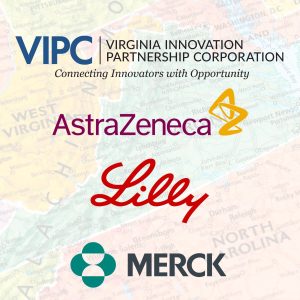 RICHMOND, Va., Nov. 20, 2025 /PRNewswire/ — A Memorandum of Understanding (MOU) signed by the Virginia Innovation Partnership Corporation (VIPC) and AstraZeneca, Eli Lilly (Lilly), and Merck to develop the Virginia Center for Advanced Pharmaceutical Manufacturing (APM) was executed by Governor Glenn Youngkin at a statewide gathering with key leaders from Virginia’s life sciences ecosystem, higher-ed universities, and community colleges on October 31. This landmark public-private industry partnership commits $120 million of workforce investment from AstraZeneca, Lilly, and Merck, and builds directly on their recently announced $12.5 billion of capex expansion investment in Virginia, which will create thousands of new jobs over the next several years.
RICHMOND, Va., Nov. 20, 2025 /PRNewswire/ — A Memorandum of Understanding (MOU) signed by the Virginia Innovation Partnership Corporation (VIPC) and AstraZeneca, Eli Lilly (Lilly), and Merck to develop the Virginia Center for Advanced Pharmaceutical Manufacturing (APM) was executed by Governor Glenn Youngkin at a statewide gathering with key leaders from Virginia’s life sciences ecosystem, higher-ed universities, and community colleges on October 31. This landmark public-private industry partnership commits $120 million of workforce investment from AstraZeneca, Lilly, and Merck, and builds directly on their recently announced $12.5 billion of capex expansion investment in Virginia, which will create thousands of new jobs over the next several years.
The Virginia Center for APM will span Virginia’s Richmond-Petersburg-Charlottesville corridor in central Virginia – a U.S. EDA-designated tech hub for advanced pharmaceutical manufacturing – and create a neutral, industry-aligned workforce training and education center that offers opportunity for all Virginians. The Center will prepare students and workers for the next generation of high-quality, high-demand advanced manufacturing jobs in biopharma through hands-on GMP-simulated training, industry credentials and certifications, and employer apprenticeships and internships. Operating in close collaboration with Virginia’s leading universities and community colleges, including the University of Virginia, Virginia Commonwealth University, Virginia Tech, Old Dominion University, James Madison University, and Hampton University, as well as Brightpoint Community College, Reynolds Community College, Piedmont Virginia Community College, and Blue Ridge Community College, the Center will enable workforce training pathways across technician levels as well as associate, bachelor’s, master’s, and Ph.D. programs.
VIPC serves as Virginia’s designated statewide economic development authority for accelerating innovation ecosystem growth throughout the Commonwealth and across key strategic industries by fueling research, commercialization, entrepreneurship, talent, place-making infrastructure, access to capital, and public-private partnerships. VIPC has supported Virginia’s life sciences innovation ecosystem by catalyzing new statewide initiatives including Virginia’s Research Diamond for university research and science development, Virginia’s Lab-to-Launch for technology commercialization, the Virginia Accelerator Network for startup entrepreneur support, and Virginia Invest for access to investor capital. VIPC leads with collaboration, working closely with regional stakeholders and other state economic development agencies including VEDP, GO Virginia, Virginia Works, Virginia Small Business Financing Authority, and the Tobacco Region Revitalization Commission.
“Talent and workforce are essential ingredients in cultivating a thriving innovation ecosystem. VIPC is thrilled to partner with life sciences industry leaders, regional ecosystem stakeholders, and our world-class universities and community colleges to grow talent, innovation, and opportunity in the Commonwealth,” said Joe Benevento, President and CEO of VIPC. “Together, we are accelerating growth in Virginia through the power of collaboration and innovation.”
“VCU was a pioneer and has long been committed to the nation’s pharmaceutical engineering and drug development pipeline. Our overall goal has always been simple yet profound: unite talent and spark innovation through thoughtful research to produce better public health outcomes. This partnership accelerates that mission and positions Virginia to improve, and save, countless lives,” said VCU President Michael Rao, Ph.D.
“Through strategic partnerships and cutting-edge research, the University of Virginia is driving discoveries that shape the future and create real-world impact. We are proud to be part of this collaboration that will advance knowledge and strengthen Virginia’s innovation ecosystem, fueling economic growth and creating opportunities that benefit communities across the Commonwealth,” said Brie Gertler, UVA Interim Executive Vice President and Provost.
“I am thrilled at the opportunities the Center will provide for educators and workforce professionals to better work with industry to provide Virginia’s secondary and higher education students as well as our adult learners, transitioning military service members, and other job seekers and career switchers with industry-aligned instruction, credentials, assessments, and work-based learning,” said Elizabeth Creamer, Vice President, Community College Workforce Alliance, a division of Reynolds and Brightpoint Community Colleges.
“This moment reflects the power of partnership at its best: public and private sectors coming together to build better medicine, create meaningful careers, and strengthen the supply chain infrastructure that serves us all,” said Robby Demeria, founding Board Chair of the Alliance for Building Better Medicine. “This transformative investment embodies the mission that has guided the Alliance since its formation and represents the type of momentum we set out to create as a region just five years ago. Together, we are building better medicine.”
“The industry partnership with AstraZeneca, Lilly, and Merck – alongside – the Virginia Innovation Partnership Corporation – demonstrates – the power of collaboration to drive transformative growth in our life sciences ecosystem,” said John Newby, CEO of the Virginia Biotechnology Association. “Virginia is building a model that connects innovation, education, and industry like never before. This initiative will strengthen Virginia’s position as a national leader in biomanufacturing and ensure a robust talent pipeline to support the industry’s future, in Virginia and beyond.”
“Building a world-class pharmaceutical manufacturing workforce demands true alignment between industry, academia, and community – and Virginia is stepping into that future with intention and boldness. This new center will create exactly the kind of on-ramps, training, and upward mobility our region needs, while strengthening the commercialization engine that drives Virginia’s biotech future,” said Nikki Hastings, PhD, Executive Director of CvilleBioHub.
About VIPC
Connecting innovators with opportunities . The Virginia Innovation Partnership Corporation (VIPC) is the designated state economic authority responsible for fueling Virginia’s innovation-driven economy by amplifying entrepreneurial startup ecosystems, accelerating technology commercialization pathways, and attracting early-stage investment capital. For more information, visit www.VIPC.org.
Contact
Jennifer Hiltwine
Senior Writer & Editor
jennifer.hiltwine@virginiaipc.org

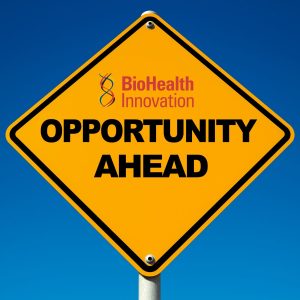 BioHealth Innovation is expanding its Entrepreneurs in Residence (EIR) network and is seeking experienced leaders at the intersection of biohealth and advanced technologies, including artificial intelligence and quantum computing.
BioHealth Innovation is expanding its Entrepreneurs in Residence (EIR) network and is seeking experienced leaders at the intersection of biohealth and advanced technologies, including artificial intelligence and quantum computing.
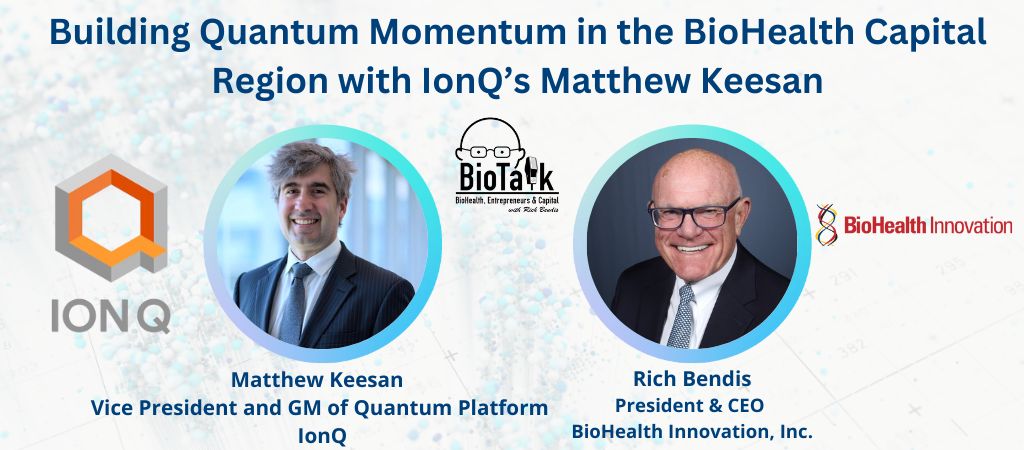
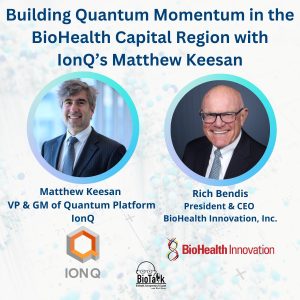 IonQ Vice President and GM of Quantum Platform Matthew Keesan joins BioTalk for a clear look at how they are advancing quantum computing from its home base in the BioHealth Capital Region. He shares the story of IonQ’s Maryland roots and explains quantum computing in straightforward terms for listeners seeking a high-level understanding. The conversation moves into why biohealth leaders should track the hardware race, what distinguishes IonQ’s approach, and how quantum is already being paired with AI to strengthen modeling and analysis. Keesan walks through early use cases showing traction today, challenges common myths about timelines, and shares which biohealth applications he expects to gain mainstream momentum by 2030.
IonQ Vice President and GM of Quantum Platform Matthew Keesan joins BioTalk for a clear look at how they are advancing quantum computing from its home base in the BioHealth Capital Region. He shares the story of IonQ’s Maryland roots and explains quantum computing in straightforward terms for listeners seeking a high-level understanding. The conversation moves into why biohealth leaders should track the hardware race, what distinguishes IonQ’s approach, and how quantum is already being paired with AI to strengthen modeling and analysis. Keesan walks through early use cases showing traction today, challenges common myths about timelines, and shares which biohealth applications he expects to gain mainstream momentum by 2030.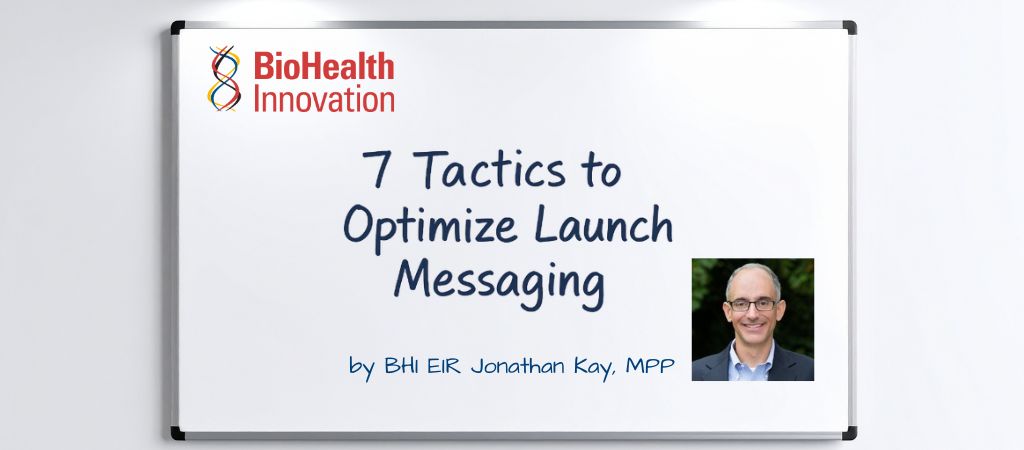
 by
by 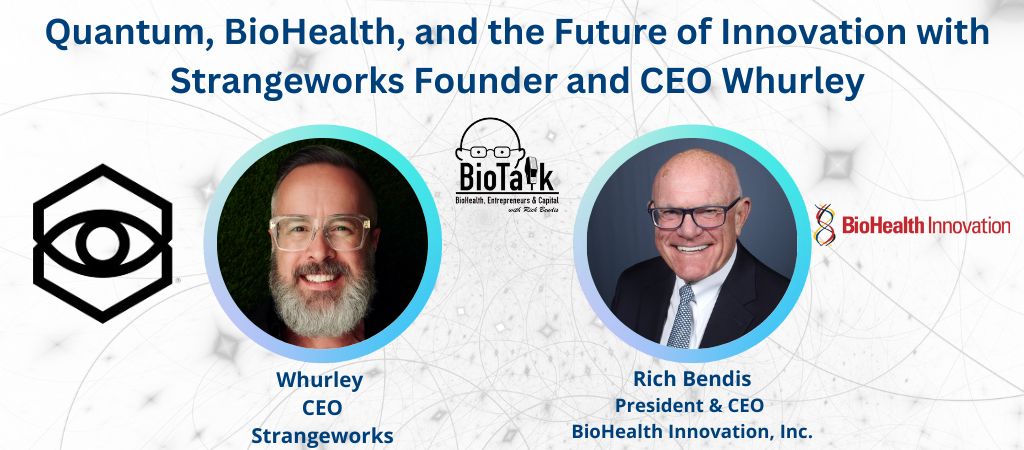
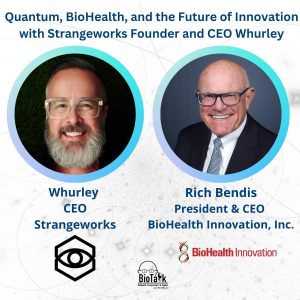 William Hurley, known widely as Whurley, joins BioTalk for a deep look at how quantum computing is moving from theory into practical use across the biohealth landscape. He opens the conversation with an introduction to Strangeworks and explains why the company is focused on making quantum computing more accessible for real-world problem-solving. The discussion explores how quantum could support breakthroughs in genomics and personalized medicine, improve the way clinical trials are modeled, and strengthen manufacturing and supply chain operations. Whurley also talks through the ingredients required for regional leadership in this space, including infrastructure, strategic partnerships, and a specialized workforce. He shares his view on what will distinguish successful players in quantum from those who overpromise or misread the market, and closes with a forward look at the convergence of quantum, AI, and biotechnology and the impact these capabilities could have on healthcare innovation. The conversation follows his recent keynote appearance at the BioHealth Capital Region Forum this past September.
William Hurley, known widely as Whurley, joins BioTalk for a deep look at how quantum computing is moving from theory into practical use across the biohealth landscape. He opens the conversation with an introduction to Strangeworks and explains why the company is focused on making quantum computing more accessible for real-world problem-solving. The discussion explores how quantum could support breakthroughs in genomics and personalized medicine, improve the way clinical trials are modeled, and strengthen manufacturing and supply chain operations. Whurley also talks through the ingredients required for regional leadership in this space, including infrastructure, strategic partnerships, and a specialized workforce. He shares his view on what will distinguish successful players in quantum from those who overpromise or misread the market, and closes with a forward look at the convergence of quantum, AI, and biotechnology and the impact these capabilities could have on healthcare innovation. The conversation follows his recent keynote appearance at the BioHealth Capital Region Forum this past September.
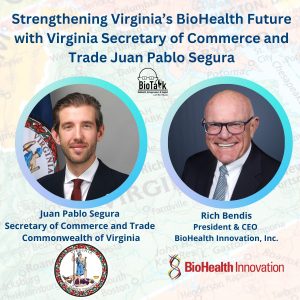 Secretary Juan Pablo Segura joins BioTalk for a conversation about Virginia’s growing position in the biohealth economy and the statewide strategy behind it. He outlines the significance of the new partnership with AstraZeneca, Lilly, and Merck, including up to $120 million in private investment to create a workforce development center and expand the Commonwealth’s life sciences capacity. Segura talks through how Virginia approaches company recruitment, what investors are responding to, and why the state is seeing increased interest from biomanufacturing and advanced R&D companies. He also discusses Virginia’s use of public-private partnerships to accelerate industry growth, strengthen the talent pipeline, and support emerging hubs across the Commonwealth. The conversation closes with a look at Virginia’s role in the BioHealth Capital Region and how the regional identity helps amplify the state’s message as it continues building a competitive biohealth ecosystem.
Secretary Juan Pablo Segura joins BioTalk for a conversation about Virginia’s growing position in the biohealth economy and the statewide strategy behind it. He outlines the significance of the new partnership with AstraZeneca, Lilly, and Merck, including up to $120 million in private investment to create a workforce development center and expand the Commonwealth’s life sciences capacity. Segura talks through how Virginia approaches company recruitment, what investors are responding to, and why the state is seeing increased interest from biomanufacturing and advanced R&D companies. He also discusses Virginia’s use of public-private partnerships to accelerate industry growth, strengthen the talent pipeline, and support emerging hubs across the Commonwealth. The conversation closes with a look at Virginia’s role in the BioHealth Capital Region and how the regional identity helps amplify the state’s message as it continues building a competitive biohealth ecosystem.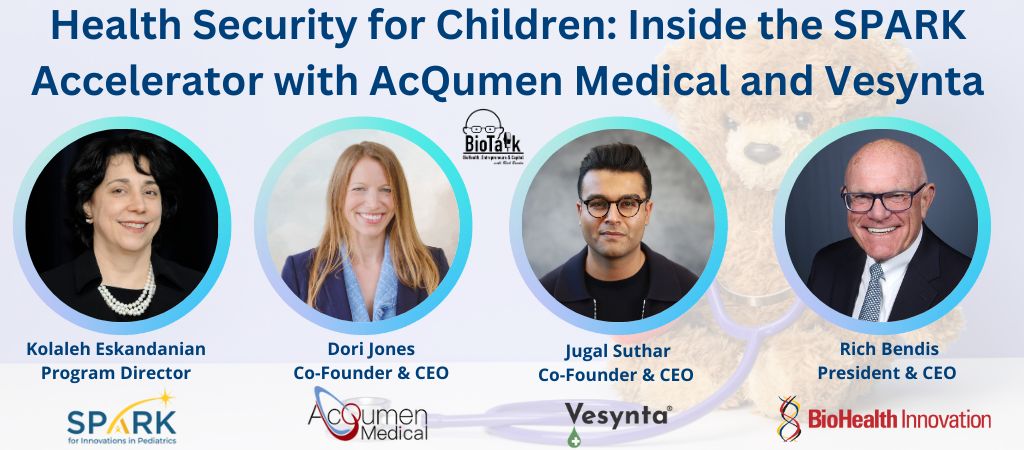
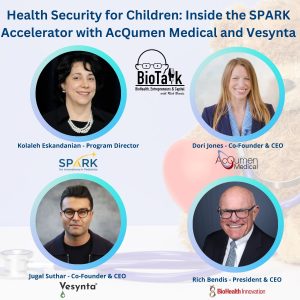 This episode brings together three leaders working at the intersection of pediatric innovation, health security, and early-stage commercialization. Kolaleh Eskandanian, Program Director of SPARK, is joined by founders Dori Jones of AcQumen Medical and Jugal Suthar of Vesynta for a conversation about advancing breakthrough solutions for children. They discuss the mission behind the BARDA-funded SPARK for Innovations in Pediatrics Hub at Children’s National Hospital, the challenges of developing technologies for pediatric populations, and the impact of public-private partnerships in moving lifesaving tools to market. Dori and Jugal share what their companies are building, the inflection points that shaped their journeys, and how BioHealth Innovation’s Entrepreneur-in-Residence program supported their progress. The group reflects on lessons learned, the value of mentorship, and how collaborative accelerator ecosystems help drive breakthroughs in pediatric care, preparedness, and health equity.
This episode brings together three leaders working at the intersection of pediatric innovation, health security, and early-stage commercialization. Kolaleh Eskandanian, Program Director of SPARK, is joined by founders Dori Jones of AcQumen Medical and Jugal Suthar of Vesynta for a conversation about advancing breakthrough solutions for children. They discuss the mission behind the BARDA-funded SPARK for Innovations in Pediatrics Hub at Children’s National Hospital, the challenges of developing technologies for pediatric populations, and the impact of public-private partnerships in moving lifesaving tools to market. Dori and Jugal share what their companies are building, the inflection points that shaped their journeys, and how BioHealth Innovation’s Entrepreneur-in-Residence program supported their progress. The group reflects on lessons learned, the value of mentorship, and how collaborative accelerator ecosystems help drive breakthroughs in pediatric care, preparedness, and health equity.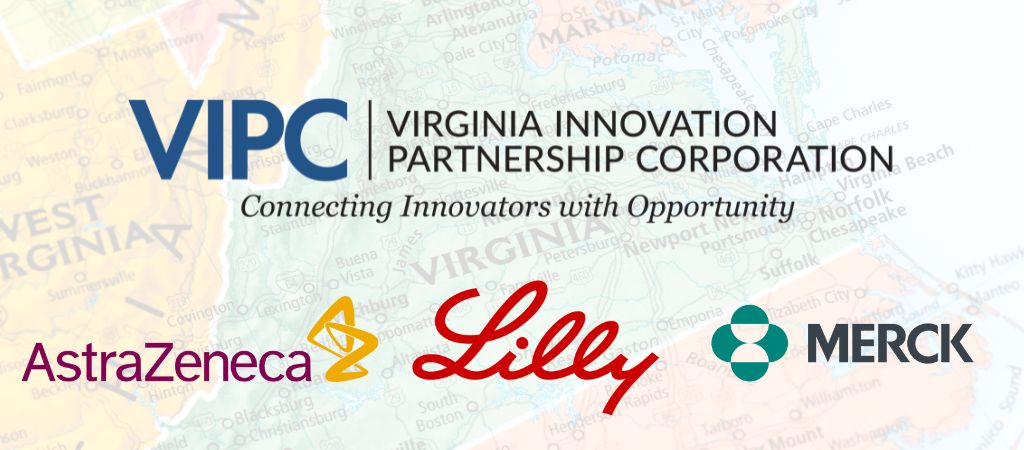
 RICHMOND, Va.
RICHMOND, Va.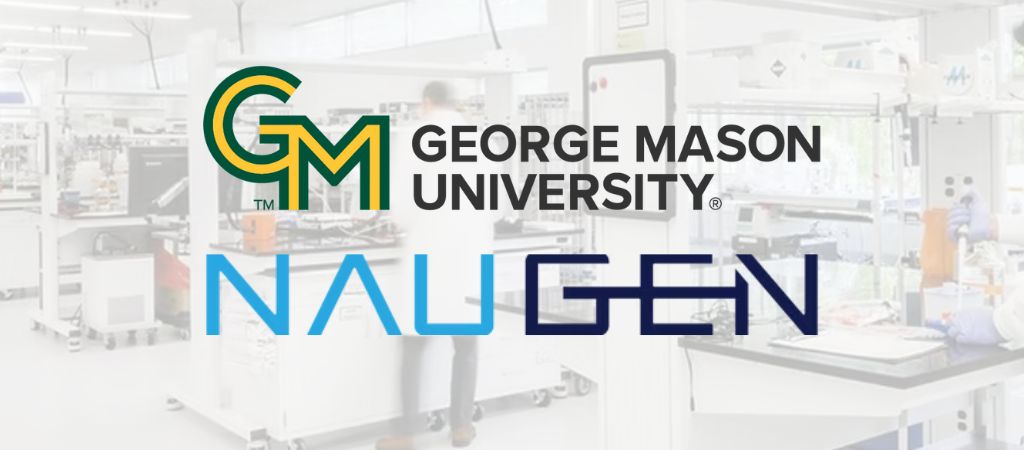
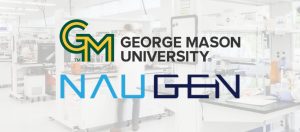 This month, a new Northern Virginia International Soft-Landing Accelerator (NISA) program, designed to help start-ups from around the globe find guidance, connections, and lab or office spaces at no cost, was launched to help develop new technologies in life sciences.
This month, a new Northern Virginia International Soft-Landing Accelerator (NISA) program, designed to help start-ups from around the globe find guidance, connections, and lab or office spaces at no cost, was launched to help develop new technologies in life sciences.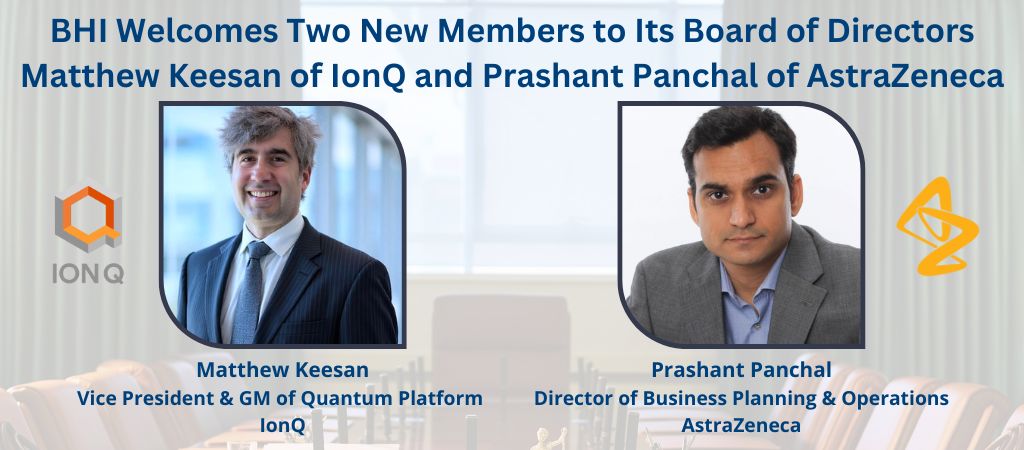
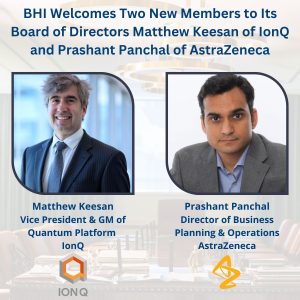 BioHealth Innovation, Inc. (BHI), a leading public-private nonprofit organization supporting healthcare innovation in the BioHealth Capital Region, announces the appointment of two new members to its Board of Directors: Matthew Keesan, Vice President and GM of Quantum Platform at IonQ, and Prashant Panchal, Director of Business Planning and Operations at AstraZeneca. Their backgrounds strengthen BHI’s commitment to advancing a region known for scientific leadership, emerging technologies, and next-generation workforce development.
BioHealth Innovation, Inc. (BHI), a leading public-private nonprofit organization supporting healthcare innovation in the BioHealth Capital Region, announces the appointment of two new members to its Board of Directors: Matthew Keesan, Vice President and GM of Quantum Platform at IonQ, and Prashant Panchal, Director of Business Planning and Operations at AstraZeneca. Their backgrounds strengthen BHI’s commitment to advancing a region known for scientific leadership, emerging technologies, and next-generation workforce development.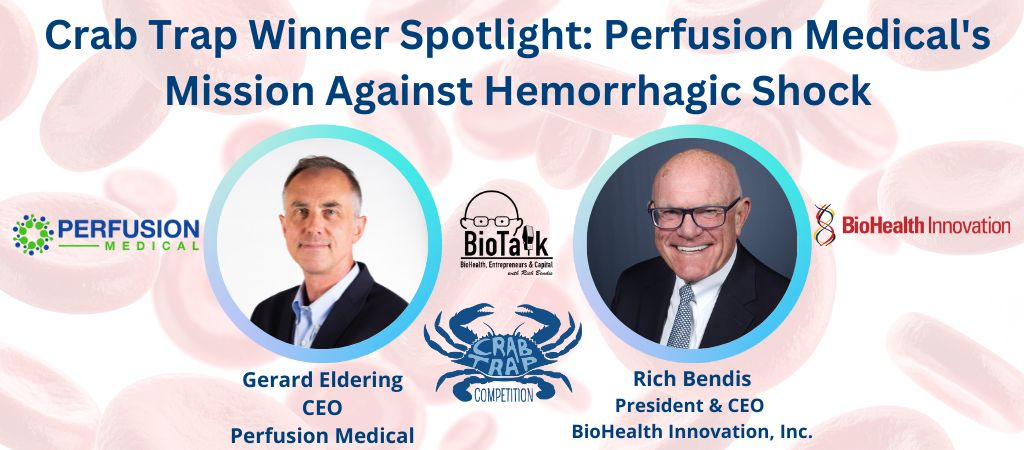
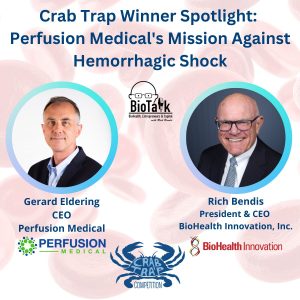 In this episode of BioTalk, CEO Gerard Eldering explains how Perfusion Medical is addressing a problem that trauma physicians and military medics have been struggling with for decades: capillary compression. Perfusion Medical is developing a drug aimed at treating hemorrhagic shock and other ischemic conditions. PM‑208 is a novel IV therapeutic designed to restore capillary blood flow, resolve ischemia, and protect vital organs. The team has advanced this work with $19 million in Department of Defense funding. He describes the scale of the unmet need, why PM‑208 is both organ- and disease‑agnostic, and how its simple formulation and strong safety profile position it for broad medical use.
In this episode of BioTalk, CEO Gerard Eldering explains how Perfusion Medical is addressing a problem that trauma physicians and military medics have been struggling with for decades: capillary compression. Perfusion Medical is developing a drug aimed at treating hemorrhagic shock and other ischemic conditions. PM‑208 is a novel IV therapeutic designed to restore capillary blood flow, resolve ischemia, and protect vital organs. The team has advanced this work with $19 million in Department of Defense funding. He describes the scale of the unmet need, why PM‑208 is both organ- and disease‑agnostic, and how its simple formulation and strong safety profile position it for broad medical use.